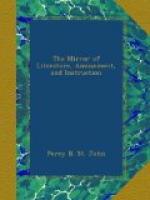Such Spiritual Creature—too spiritual long to sojourn below the skies—wert Thou, whose rising and whose setting—both most starlike—brightened at once all thy native vale, and at once left it in darkness. Thy name has long slept in our heart—and there let it sleep unbreathed—even as, when we are dreaming our way through some solitary place, without speaking, we bless the beauty of some sweet wild-flower, pensively smiling to us through the snow!
The Sabbath returns on which, in the little kirk among the hills, we saw thee baptized. Then comes a wavering glimmer of seven sweet years, that to Thee, in all their varieties, were but as one delightful season, one blessed life—and, finally, that other Sabbath, on which, at thy own dying request—between services thou wert buried!
How mysterious are all thy ways and workings, O gracious Nature! Thou who art but a name given by our souls, seeing and hearing through the senses, to the Being in whom all things are and have life! Ere two years old, she, whose dream is now with us, all over the small silvan world, that beheld the revelation, how evanescent! of her pure existence, was called the “Holy Child!” The taint of sin—inherited from those who disobeyed in Paradise—seemed from her fair clay to have been washed out at the baptismal font, and by her first infantine tears. So pious people almost believed, looking on her so unlike all other children, in the serenity of that habitual smile that clothed the creature’s countenance with a wondrous beauty, at an age when on other infants is but faintly seen the dawn of reason, and their eyes look happy, just like the thoughtless flowers. So unlike all other children—but unlike only because sooner than they—she seemed to have had given to her—even in the communion of the cradle—an intimation of the being and the providence of God. Sooner, surely, than through any other clay that ever enshrouded immortal spirit, dawned the light of reason and of religion on the face of the “Holy Child.”
Her lisping language was sprinkled with words alien from common childhood’s uncertain speech, that murmurs only when indigent nature prompts;—and her own parents wondered whence they came in her simplicity, when first they looked upon her kneeling in an unbidden prayer. As one mild week of vernal sunshine covers the braes with primroses, so shone with fair and fragrant feelings—unfolded, ere they knew, before her parents’ eyes—the divine nature of her who, for a season, was lent to them from the skies. She learned to read out of the Bible—almost without any teaching—they knew not how—just by looking gladly on the words, even as she looked on the pretty daisies on the green—till their meanings stole insensibly into her soul, and the sweet syllables, succeeding each other on the blessed page, were all united by the memories her heart had been treasuring every hour that her father or her mother had read aloud in her hearing from the Book of Life. “Suffer little children to come unto me, and forbid them not, for of such is the kingdom of Heaven”—how wept her parents, as these the most affecting of our Saviour’s words dropt silver-sweet from her lips, and continued in her upward eyes among the swimming tears!




